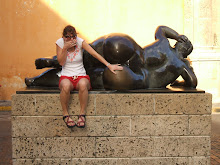Just as we heard many stories about forced displacement, we heard many accounts of current struggles in the humanitarian zones, all of whom are under violent pressure from the paramilitary-backed large land holders who took over the lands from which the communities were displaced.
The most extreme and most intense testimony we heard was in a tiny, recently-established humanitarian zone named for its leader who was assassinated in January of this year by two local known paramilitary agents who operate openly and with impunity. The wheels of justice turn excruciatingly slowly in Colombia, however, and the case has not moved forward. Now his brother who I'll call Javier, a soft-spoken man who spoke with downcast eyes, has received threats that he will end up like his brother if he does not stop his efforts to reclaim the community's land. He is afraid to leave the zone. His sister Elena wept as she talked about her fear for his safety, and person after person expressed the same concern.
The community has asked the police to patrol the perimeter of the zone to ensure its residents' safety, but this protection has yet to materialize. They do not want the army to be responsible for these patrols because they know that there are members of the paramilities working within that institution. After our meeting and lunch with the community, I chatted with a woman while she washed dishes. She illustrated why the community might need the protection of the police, she said she is afraid that the paramilitaries -- working in the service of neighboring land-holders -- will eventually just invade the zone some night while the community sleeps.
After describing their current fears, the community members spoke movingly about their life before their forced eviction by the army and paramilitaries. "We used to live well," said one woman. Elena told us that "Life was easier before. We had daily food . . . and were able to go to [the nearby town of] Mutatá to study. . . . But happiness doesn't last . . . I had to leave everything I loved." After hearing testimony like this, it was hard to leave this particular zone knowing that sometimes, an international presence can discourage paramilitary attacks.
But we had to get to a meeting with an official of the 17th brigade of the Colombian army, the military unit charged with providing security in the region we had visited (and the brigade that the communities had charged works hand-in-hand with paramilitary organizations). In a frigid, air-conditioned, and windowless meeting room, we spoke with a lieutenant who serves as the brigade's human rights officer. His answers to our carefully-constructed questions were at times telling and at times laughable. He explained that the primary factor that demonstrates improved security in the region is increased foreign and national investment. "The [civilian] population is not at risk today. This is proven by foreign investment," he said. Needless to say this comment belies the government's priority for the region and, in light of all we had heard in the humanitarian zones, begs the question "security for whom"? He went on: "The facts speak for themselves. There have been no violent deaths in the region and no attacks on civilians in this region." When asked about links between the army and paramilitary groups, he said that if they had existed, it was in the distant past. We left that meeting dismayed and more convinced than ever of the army's (and therefore the government's) total lack of concern for marginalized people like those who live in the humanitarian zones we had visited.
In light of all that we had seen an heard during our days in these rural parts of the Lower Atrato region I felt that there is little reason for optimism regarding the achievement of a real and sustainable peace in Colombia, the government's claims to the contrary notwithstanding. I had suspected as much even before my visit to the region. When I think back to my original reasons for going on this delegation, I can say that I accomplished what I had hoped to. I travelled far from the bubble of Bogotá. I saw the grinding poverty in which so many Colombians live. I got to be a witness to the realities of people affected by Colombia's enduring armed conflict. I was deeply moved and with a sense of responsibility to bear witness to these realities.

No comments:
Post a Comment